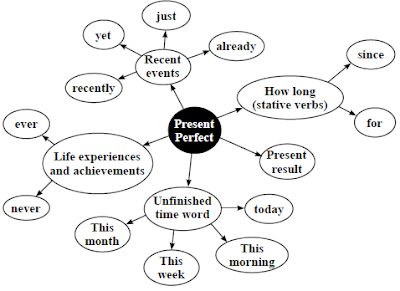Class 11 English Unit 13 Career and Entrepreneurship answer
What is present perfect tense?
→ The present perfect tense denotes to an action or state that either
occurred at an indefinite time in the past (e.g., I have talked before) or
began in the past and continued to the present time (e.g., she has grown calm
over the last hour).
- This tense is formed using have/has + the past participle.
What is simple tense?
→ The simple past tense denotes a completed activity that happened in the
past. In other words, the activity began in the past and ended in the past.
- This tense is formed using past verb (V2)
Grammar
Present perfect and past simple
A. Notice the use of present perfect
and past simple in the following text.
|
I think I have had
a very interesting life. I'm 73 now and I don't work anymore. I was in the army for 31 years. I retired when I was 52.
I have been to so many countries that I can't remember all of them. I've been to Australia six or seven times and to South Africa three
times. I have also been once to Russia but I didn't like
it at all: much too cold for me! I've never been
on television, but I've been on
the radio once. It was a programme
about life in the military about twenty
years ago. I've met a lot of
famous people: members of the royal family, famous politicians and also
famous cinema and television personalities. I've never met the American President though which is a pity. Because I've
travelled a lot, I've seen a
lot of wonderful things and have
also eaten and drunk some strange foods and drinks.
I ate cat and rat in India and drank something called Mirto on a
little island in Italy many years ago. |
B. Look at the diagram about the use
of present perfect tense.
C. We use the past simple for past events or actions which have no connection to the present and the present perfect to talk about completed actions which have impacts to the present.
I lost my keys yesterday.
I’ve lost my key. I can’t find
it anywhere.
D. We use both 'been (to)' and 'gone (to)'
as the past participle of 'go', but
with different meanings.
I’ve been to Muktinath.
Prem is on holiday. He has gone
to Ilam.
Sarika is back home now. She has
been to Jumla.
E. Use the correct tense of the verbs
in brackets.
a. I don't know where Muna is. ……
(you/see) her?
→ I don't know where Muna is. Have you seen her?
b. Janak …… (not/be) very well last
week.
→ Janak was not very well last week.
c. Last night I …… (lose) my keys. So
I stayed in my friend’s home.
→ Last night I lost my
keys. So I stayed in my friend’s home.
d. I …… (lose) my keys. Can you help
me look for them?
→ I have lost my keys. Can you help me look for them?
e. I …… (know) Jamuna for three
years. We still meet once a month.
→ I have known Jamuna for three years. We still meet once a month.
f. She …… (live) in Sikkim when she was
a child.
→ She lived
in Sikkim when she was a child.
g. A: What’s wrong?
B: I …… (break) a glass.
→ I broke
a glass.
h. A: When …… (you/arrive)?
→ When did you arrive?
B: At 10 pm last night.
i. How long …… (you/know) Sarmila
for?
→ How long have you known Sarmila for?
j. This is the first time I ……
(drive) a car.
→ This is the first time I have ever driven a
car.
F. Use been or gone.
a. I’ve never …… to Japan.
→ I’ve never been
to Japan.
b. Kalpana has …… to Korea. She may
come back next year.
→ Kalpana has gone
to Korea. She may come back next year.
c. A: Where’s Rachana?
B: She has …… to the shops.
→ She has gone
to the shops.
d. Harina was here earlier but I
think she has …… now.
→ Harina was here earlier but I think she has gone now.
e. Have you ever …… to London?
→ Have you ever been to London?
